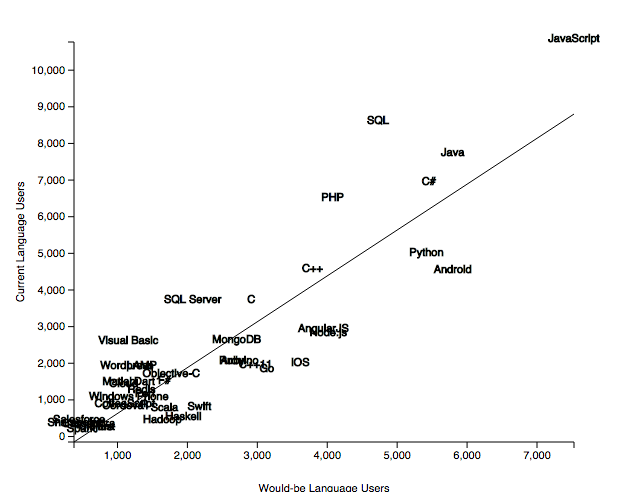The job outlook for tech careers in general is extremely promising. But which tech careers are the most promising, going into the future? We analyzed the data on the fastest-growing tech careers, fastest-growing programming languages, the highest paying tech companies, and the best tech careers for work-life balance, to give you an idea of which tech careers you might want to get into in 2017.
FASTEST GROWING TECH CAREERS
According to Business Insider, the top five fastest-growing tech careers are:
1 Web developer (27% growth)
2 Computer Systems Analyst (21% growth)
3 Information Security Analyst (18% growth)
4 Software Engineer (17% growth)
5 Data Scientist (16% growth)
While there’s a lot of talk about the boom in demand for Data Scientists, not much is said about the out-of-control demand for web developers. At 27% growth, Web Developer jobs are growing, in the words of the Bureau of Labor Statistics, “much faster than average.”
Every single company in America today needs a web developer (or three) to build (or modernize) their websites, build their web apps, enhance their web presence, extend their reach, and improve their brands.
Web developer jobs aren’t just growing quickly in relation to other tech jobs; they’re up there in the top 25 fastest growing professions out of all of the thousands of professions in the BLS’s database.
This is very encouraging news for anybody who wants to get into tech but doesn’t necessarily have 4+ years to invest in a computer science degree. While becoming a data scientist (for example) might be extremely difficult without devoting years to studying computer science, anybody with a laptop and an internet connection can become a web developer in a matter of months. Here at FVI, we even offer an evenings-only program, where students with no prior tech experience can become employable web developers in nine short months, in their spare time.
FASTEST GROWING PROGRAMMING LANGUAGES
If you’re going to get into tech, you’re going to need to learn how to code at some point. Many people feel overwhelmed by all of the options. Should I learn Python? Ruby? C++? JavaScript?
Of course, the language you choose to learn will have a lot to do with what you want to do with it. For example, if you want to be a web developer, you’ll most likely want to learn JavaScript, since JavaScript is the language of the web. If you’re planning to create a new operating system, on the other hand, you might want to learn C++; or if you’re planning on doing a lot of Android app development, you’d prefer to go for Java.
Overall, though, what is the fastest-growing programming language of them all? Taking a look at the languages that are gathering the most steam can help us to see the bigger picture of where the general tech market is going.
New York based software engineer and data scientist Nathan Epstein crunched the numbers, and has ranked the fastest growing languages as follows:
- JavaScript
- Java
- Android
- C#
- Python
- SQL
- PHP
- Node.js
- AngularJS
- C++
BEST WORK-LIFE BALANCE
Everyone wants to have it all; a fun job, a great income, and lots of leisure time to spend with family and friends. Unfortunately, in this day and age, the best most people will be able to achieve is some compromise between those three desires. Fun jobs tend not to pay very well, and high paying jobs often require 60-70 hour work weeks.
According to Glassdoor.com’s research, work-life balance has been decreasing in general across all industries, for American workers. On Glassdoor’s scale (from one through five, with five being the best and one being the worst), the average American worker ranked his/her work-life balance at a 3.5. That was in 2009. By 2015, that number had dropped to 3.2.
Tech is known as an industry where workers tend to go “all-in” on their projects; eating, sleeping, and breathing code, 24/7. One might think that tech jobs would tend to have a below-average work-life balance. The truth is, though, that according to Glassdoor’s empirical research, tech jobs are actually ranked quite highly for work-life balance.
In a report published in October 2016, five of the top ten jobs for work-life balance in 2016 were, in fact, tech jobs! Of the top 25, ten were tech careers (all numbers courtesy of Glassdoor.com):
Top 10 Tech Careers for Work-Life Balance
2. UX Designer
Work-Life Balance Rating: 4.1
Median Salary: $95,000
3. Data Scientist
Work-Life Balance Rating: 4.0
Median Salary: $112,000
5. UI Designer
Work-Life Balance Rating: 4.0
Median Salary: $84,500
8. Mobile Developer
Work-Life Balance Rating: 4.0
Median Salary: $101,318
9. Devops Engineer
Work-Life Balance Rating: 4.0
Median Salary: $110,000
12. Scrum Master
Work-Life Balance Rating: 3.9
Median Salary: $89,428
16. PHP Developer
Work-Life Balance Rating: 3.8
Median Salary: $79,923
17. Web Designer
Work-Life Balance Rating: 3.8
Median Salary: $61,198
18. Content Manager
Work-Life Balance Rating: 3.8
Median Salary: $73,909
25. Computer Programmer
Work-Life Balance Rating: 3.7
Median Salary: $75,076
Only a few of these jobs require a Bachelor’s degree, let alone any advanced (master’s/doctoral) degrees. Starting out by practicing simple web development techniques, one could progress to become a UX/UI designer, a PHP developer, a web designer, or even a scrum master, devops engineer, or mobile developer.
Whatever one chooses to do within the field of technology, it’s good to know that workers with tech skills tend to have better work-life balances than the over-worked, under-played population at large.
HIGHEST PAYING TECH COMPANIES
Glassdoor also released a list of the 25 highest paying companies in America in 2016. Tech’s dominance in this list is even more shocking than its dominance in the categories above. Out of the 25 highest-paying companies in America in 2016, 20 of them are tech companies.
3. Juniper Networks
Median Total Compensation: $157,000
Median Base Salary: $135,000
5. Google
Median Total Compensation: $153,750
Median Base Salary: $123,331
6. VMware
Median Total Compensation: $152,133
Median Base Salary: $130,000
7. Amazon Lab126
Median Total Compensation: $150,100
Median Base Salary: $138,700
9. Guidewire
Median Total Compensation: $150,020
Median Base Salary: $135,000
10. Cadence Design Systems
Median Total Compensation: $150,010
Median Base Salary: $140,000
12. Facebook
Median Total Compensation: $150,000
Median Base Salary: $127,406
13. Twitter
Median Total Compensation: $150,000
Median Base Salary: $133,000
14. Box
Median Total Compensation: $150,000
Median Base Salary: $130,000
15. Walmart eCommerce
Median Total Compensation: $149,000
Median Base Salary: $126,000
16. SAP
Median Total Compensation: $148,431
Median Base Salary: $120,000
17. Synopsys
Median Total Compensation: $148,000
Median Base Salary: $130,000
18. Altera
Median Total Compensation: $147,000
Median Base Salary: $134,000
19. LinkedIn
Median Total Compensation: $145,000
Median Base Salary: $120,000
20. Cloudera
Median Total Compensation: $145,000
Median Base Salary: $129,500
21. Salesforce
Median Total Compensation: $143,750
Median Base Salary: $120,000
22. Microsoft
Median Total Compensation: $141,000
Median Base Salary: $125,000
23. F5 Networks
Median Total Compensation: $140,200
Median Base Salary: $120,500
24. Adobe
Median Total Compensation: $140,000
Median Base Salary: $125,000
25. Broadcom
Median Total Compensation: $140,000
Median Base Salary: $130,000
“The war for [tech] talent is still very active.” — Dr. Andrew Chamberlain
Remarking on the astounding dominance of tech companies in this list, Glassdoor’s Chief Economist, Dr. Andrew Chamberlain, said, “In technology, we continue to see unprecedented salaries as the war for talent is still very active, largely due to the ongoing shortage of highly skilled workers needed.”
We’ve been saying exactly the same thing, for years, here at FVI. Demand for tech workers is growing every year, and there just aren’t enough coders to fill the job openings. That’s why we created our 9-month, evenings-only Web Developer program, right here in the heart of Miami. There are hundreds of thousands of people here in Miami, many of whom don’t have college degrees and are working multiple jobs just to make ends meet. We’ve made it our mission to bring these in-demand technical skills to the people who need it the most.
If you’re thinking about making the jump into tech, or you just want to test the waters a little bit, give us a call at 786-574-3350. We’re here to help.







